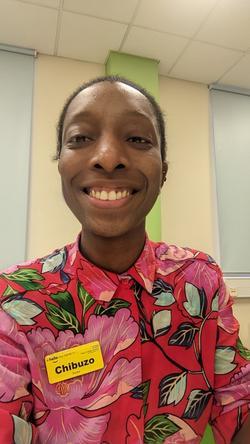Dr Chibuzo Mowete, Haematologist
Getting early exposure to haematology is great. There are many events available for students to attend either through the Royal College of Pathology or the British Society for Haematology to get to know the specialty more. Also, there’s always a lot of research going on in haematology so a helpful pair of hands is always appreciated.

Can you tell us what haematology is?
Haematology is a specialty which looks after people with disorders of the blood. It’s an incredibly broad specialty and includes the care of those with red cell disorders such as sickle cell disease, bleeding disorders (both acquired and inherited), thrombosis, haemato-oncology and transfusion medicine. It also traverses both medicine and pathology so haematologists are members of both royal colleges.
Can you tell us about your average working day?
I’m currently taking time out of haematology registrar training to focus on research so my average working day is quite variable. My research is connected to a national transfusion clinical trial so at the moment much of my time is spent gathering clinical data and seeking consent from patients for the study. I also spend a bit of time in the lab testing the blood samples from the research participants.
I still do some clinical work and once a week have a new patient thrombosis clinic followed by a multidisciplinary team meeting. It’s quite different from my role as a haematology registrar where my days would consist of ward rounds, outpatient clinics, bone marrow biopsy lists, blood film/bone marrow reporting and providing haematology advice for other teams.
Why did you choose this specialty?
When I was at university I really didn’t know which specialty I wanted to go into. I went into each rotation with an open mind and tried to think about which parts of the different specialties I enjoyed. I knew I wanted to pursue a medical specialty and took a year out of training after F2 to explore this further. During this time I had a trust grade job in haematology which I loved, particularly being involved in the care of patients with chronic illnesses and the rewards as well as the challenges that this brought.
I later had some career coaching which provided dedicated time to consider what I wanted in a career and importantly which type of job would complement my personality and skillset. Haematology seemed to be the answer!
Although I didn’t have a haematology rotation during core medical training, as it was in those days, I managed to organise a taster week. I attended specialist clinics in haemostasis and thrombosis, pregnancy and malignant haematology as well as joining the different sub-speciality ward rounds. It wasn’t until later that I had some transfusion exposure but honestly there was nothing I didn’t enjoy. Also, the haematologists I worked with were so enthusiastic about their job and generous with their time, taking me to the lab and later supporting me with completing my application.
What do you enjoy most about your chosen specialty?
There are lots of things I enjoy about haematology. I really appreciate the breadth that the specialty offers and the variability that the week offers. I didn’t think that I would like the procedural side of the job but it can be quite satisfying to perform a procedure well for a patient who may have been anxious about it. I’ve been blessed with some lovely colleagues in all my haematology posts so even when work is busy and tiring we can still have a laugh which is so important as haematology can be an emotionally challenging job. Also, their support though the exam process, which can feel like a marathon, has been such a help too.
What do you find most rewarding about the role?
I love that I am able to really follow the patient journey from diagnosis in the lab to treatment at the bedside. There are few specialities who are involved in the care of the patient in this way. It is also a real privilege and responsibility to be involved in the care of people at truly challenging times in their lives, whether this is someone newly diagnosed with a condition or someone who has come in a complication of a chronic illness. I think looking after someone with real empathy has a lasting effect not just for the patient but for the doctor too.
What advice would you give to students looking to enter your field?
I spent a long time considering what sort of doctor I wanted to be but also what sort of life I wanted and which specialty would enable me to have that. I think getting work experience and having conversations with those already in the career is so important to get a real sense of what the job will entail.
I was a bit daunted by the exams but actually found that studying for something that I had a genuine interest in wasn’t so bad at all. I had a lovely study group who supported each other with resources (and snacks) to help get through the ordeal!
Getting early exposure to haematology is great. There are many events available for students to attend either through the Royal College of Pathology or the British Society for Haematology to get to know the specialty more. Also, there’s always a lot of research going on in haematology, so a helpful pair of hands is always appreciated. Getting involved by asking around is a good way to have some hands on experience of working in haematology.
